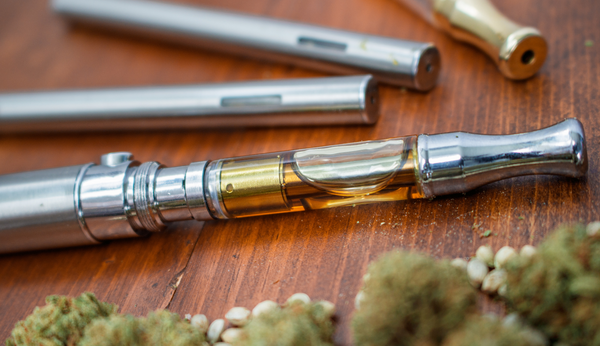Your Cart is Empty
FREE SHIPPING ON ALL ORDERS $75+
As the federal government legalized hemp, they also legalized CBD and other hemp derivatives, like Delta-8-THC. There’s no prohibition on a federal scale, but is Delta-8-THC legal in Montana?
Montana has legalized hemp and hemp derivatives which makes CBD and other hemp cannabinoids legal in the state. Unfortunately, Montana has not yet made exceptions in their Controlled Substances Act for THC’s derived from hemp, a key factor in the legalization of Delta-8-THC.
Until things change, Delta-8-THC may not be accessible in the state.
Here’s how Delta-8 Montana laws break down:
Disclaimer: We’re always working to stay informed on the latest Delta-8 laws and research. However, state laws are subject to change and we advise that you do your own research to verify the information you find in this article. This is not intended as legal advice.
Montana Delta-8-THC Laws
Is Delta-8 a Controlled Substance in Montana?
Delta-8-THC Possession Limits in Montana
Is Delta-9-THC Legal in Montana?
Where to Buy Delta-8 in Montana
Is Delta-8 Legal in All 50 States?
Resources
Montana has updated their hemp laws to legalize some hemp derivatives, like CBD. However, the state’s current legislation places limitations on tetrahydrocannabinols. The state defines “marijuana” as “all plant material from the genus Cannabis containing tetrahydrocannabinol (THC).”
Unfortunately, the state also lists all tetrahydrocannabinols and its isomers as a Schedule I Controlled Substance in the state, and the text makes no exception for THC derived from hemp.
Delta-9-THC is only allowed in amounts up to or less than 0.3% on a dry weight basis. All other forms of THC, in any amount, are considered a Controlled Substance. Until this changes, Delta-8-THC is illegal in Montana.
Here are some highlights from the relevant text:
MONTANA CODE ANNOTATED 2019 - EFFECTIVE FROM 8/24/2019
(2) “Hemp” means the plant Cannabis sativa L. and any part of such plant, whether growing or not, with delta-nine tetrahydrocannabinol (THC) concentration of no more than 0.3 percent on a dry weight basis.
(3) “Hemp plant extract” means a processed product from hemp plant or floral material including but not limited to oil, powder, cake, pellet, etc.
(18) ”Marijuana (marihuana)” means all plant material from the genus Cannabis containing tetrahydrocannabinol (THC) or seeds of the genus capable of germination.
(4) Hallucinogenic substances. (ff) tetrahydrocannabinols, including synthetic equivalents of the substances contained in the plant or in the resinous extractives of cannabis, or synthetic substances, derivatives, and their isomers with similar chemical structure and pharmacological activity, such as those listed in subsections (4)(ff)(i) through (4)(ff)(iii). Because nomenclature of these substances is not internationally standardized, compounds of these structures, regardless of numerical designation of atomic positions covered, are included in the category as follows:
(i) delta 1 (delta 9) cis or trans tetrahydrocannabinol and its optical isomers;
(ii) delta 6 cis or trans tetrahydrocannabinol and its optical isomers; and
(iii) delta 3,4 cis or trans tetrahydrocannabinol and its optical isomers;

Unlike other states that have legalized Delta-8-THC, Montana fails to make exceptions for hemp-derived tetrahydrocannabinols in their Controlled Substances Act. That means that Delta-8-THC is currently considered a Schedule I Controlled Substance in Montana.
Because Delta-8 is illegal in Montana, there are no defined possession limits for the cannabinoid.
In 2011, Montana voters approved Montana Medical Marijuana Initiative by popular vote, which led to legalization of cannabis for qualifying medical patients. In 2017, the state further clarified medical cannabis laws through SB 333.
During the 2020 election, Montana also approved Initiative 190 by popular vote, also known as the Marijuana Legalization and Tax Initiative. This new legislation approved the recreational use of cannabis for consumers 21 and older, and access through state dispensaries is expected to roll out in 2021.

Delta-8-THC is illegal in Montana and cannot be legally purchased in the state.
In places where Delta-8-THC is legal (like neighboring states Washington, Oregon, and Wyoming), many people prefer to shop online. It's advisable to proceed with caution when choosing a Delta-8 distributor. Shopping online allows you to buy directly from a brand or manufacturer, instead of purchasing through a third-party vendor that may not fully understand Delta-8 effects and uses or the laws surrounding Delta-8 products.
At Vida Optima, our Delta-8-THC products comply with all parameters of the Hemp Farming Act of 2018. That means they are legal to buy online from any area where Delta-8 is legal. We can also help answer questions about Delta-8, or you can read our “What is Delta-8-THC?” guide to learn everything you need to know.
Delta-8-THC is currently federally legal under the context of the Hemp Farming Act of 2018, but each state has the right to determine its own stance on tetrahydrocannabinols derived from hemp. Delta-8-THC is illegal in Montana according to state law, but you should read more about Delta-8 laws by state to determine the legality in other areas.
Comments will be approved before showing up.



